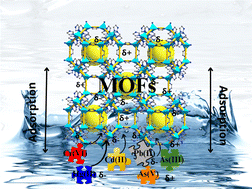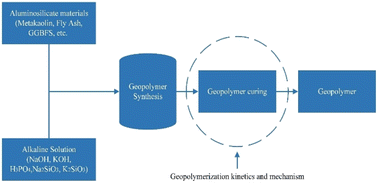
RSC Advances
Subject area
Radioactivity articles published in the last
6 months

Design and application of metal organic frameworks for heavy metals adsorption in water: a review
The growing apprehension surrounding heavy metal pollution in both environmental and industrial contexts has spurred extensive research into adsorption materials aimed at efficient remediation.

RSC Adv., 2024,14, 9365-9390
https://doi.org/10.1039/D3RA08815D
Development of electrochemical sensors for quick detection of environmental (soil and water) NPK ions
When a plant shows deficiency syndromes, sometimes it becomes too late for the farmer to apply fertilizer, as most rely on checking plant leaves to assess their nutrition level. Electrochemical sensors can bring revolution here. Other pollutants (NPK) can also be determined using these sensors.

RSC Adv., 2024,14, 9137-9158
https://doi.org/10.1039/D4RA00034J
Bioaccumulation and in vivo tracking of radiolabeled 4-nonylphenol in mice
4-Nonylphenol, an emerging endocrine disruptor, raises health concerns. Radiolabeling and in vivo tracing of 4NP reveal significant tissue accumulation, emphasizing intricate distribution and potential long-term effects for risk assessments.

RSC Adv., 2024,14, 8578-8582
https://doi.org/10.1039/D3RA08743C
A comprehensive review of synthesis kinetics and formation mechanism of geopolymers
This paper reviews synthesis kinetics and formation mechanism of geopolymers. The literature studies provided new information, and development of advanced techniques is required to study synthesis kinetics and formation mechanisms further.

RSC Adv., 2024,14, 446-462
https://doi.org/10.1039/D3RA06205H
Bacterial templated carbonate mineralization: insights from concave-type crystals induced by Curvibacter lanceolatus strain HJ-1
Schematic model of the formation mechanism of concave-type minerals.

RSC Adv., 2024,14, 353-363
https://doi.org/10.1039/D3RA06803J
Separation of americium from highly active raffinates by an innovative variant of the AmSel process based on the ionic liquid Aliquat-336 nitrate
A new variant of the AmSel (Americium Selective Separation) system for the separation of Am(III) from a PUREX raffinate was tested in which the aliphatic diluent was replaced by the ionic liquid Aliquat-336 nitrate.

RSC Adv., 2023,13, 36322-36336
https://doi.org/10.1039/D3RA06064K
Introduction to the RSC Advances themed collection on metal extraction and recycling
Professor Isabelle Billard, Professor Alexandre Chagnes, Dr Euan Doidge, Professor Jason Love and Professor Magdalena Regel-Rosocka, introduce this RSC Advances themed collection on metal extraction and recycling.

RSC Adv., 2023,13, 33696-33696
https://doi.org/10.1039/D3RA90107F
High precision measurements of lithium isotopic composition at sub-nanogram by MC-ICP-MS with membrane desolvation
The δ7Li measured with different sample sizes and different introduction system (“Wet plasma” and “Dry plasma”).

RSC Adv., 2023,13, 32104-32109
https://doi.org/10.1039/D3RA06727K
Polymer-based nanocomposite adsorbents for resource recovery from wastewater
Adsorption is alternative technique for recovery of nutrient resources with no/less secondary pollution. PNC adsorbents are effective for removal and recovery of nutrient resources, and reusing nutrients as fertilizer could prevent eutrophication.

RSC Adv., 2023,13, 31687-31703
https://doi.org/10.1039/D3RA05453E
Browse by Subject
- All (347 articles)
- Atomic/elemental (15 articles)
- Bioanalytical (72 articles)
- Chemometrics (31 articles)
- Crystallography (174 articles)
- Electroanalytical (60 articles)
- Imaging/microscopy (34 articles)
- Mass spectrometry (25 articles)
- Medical diagnostics (84 articles)
- Microfluidics (16 articles)
- Nanoanalysis (21 articles)
- Separation science (27 articles)
- Spectroscopy (97 articles)
- All (277 articles)
- Bioinorganic chemistry (53 articles)
- Bioorganic chemistry (29 articles)
- Biotechnology (46 articles)
- Cellular chemistry (62 articles)
- Computational (88 articles)
- Drug delivery (74 articles)
- Drug discovery (189 articles)
- Imaging/diagnostics (15 articles)
- Molecular biology (7 articles)
- Nanotechnology (40 articles)
- Natural products (30 articles)
- Pharmacology (96 articles)
- Photobiology (17 articles)
- Polymorphism (pharma) (1 article)
- Structural biology (12 articles)
- Toxicology (3 articles)
- All (562 articles)
- Biomaterials (103 articles)
- Biopolymers (99 articles)
- Carbon materials (103 articles)
- Composites (245 articles)
- Electronic materials (92 articles)
- Encapsulation (1 article)
- Energy applications (83 articles)
- Films/membranes (82 articles)
- Gels & soft matter (35 articles)
- Inorganic materials (50 articles)
- Medical materials (66 articles)
- Nanomaterials (126 articles)
- Optical materials (50 articles)
- Organic materials (51 articles)
- Polymers (126 articles)
- All (347 articles)
- Assembly (10 articles)
- Biotechnology (29 articles)
- Carbon nanomaterials (82 articles)
- Imaging/microscopy (15 articles)
- Nanoanalysis (39 articles)
- Nanocatalysis (34 articles)
- Nanomaterials (219 articles)
- Nanomedicine (40 articles)
- Nanotoxicology (51 articles)
- Optical nanomaterials (33 articles)
- Synthesis (13 articles)
- All (185 articles)
- Bioorganic (18 articles)
- Catalysis (46 articles)
- Fine chemicals (27 articles)
- Natural products (25 articles)
- Physical organic (9 articles)
- Stereochemistry (11 articles)
- Supramolecular (3 articles)
- Sustainable synthesis (36 articles)
- Synthetic methodology (108 articles)
- Total synthesis (14 articles)
- All (336 articles)
- Biophysics (2 articles)
- Charge transfer (30 articles)
- Electrochemistry (12 articles)
- Energy research (19 articles)
- Imaging/microscopy (6 articles)
- Kinetics & dynamics (43 articles)
- Materials (108 articles)
- Mechanics (34 articles)
- Nanoscience (73 articles)
- Photoscience (29 articles)
- Quantum & theoretical (95 articles)
- Simulations (23 articles)
- Single molecules (46 articles)
- Soft matter (5 articles)
- Spectroscopy (7 articles)
- Surfaces & interfaces (73 articles)